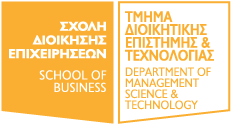Management and Information Technology
Course Description
The purpose of this course is to understand the significance of Management Science techniques and Information Systems in the contemporary business environment so that business management can make the right decisions by utilizing modern Management Science techniques and Information and Communication Technologies. The course emphasizes both on practical/technical issues (assuming the student has some technical familiarity with informatics) and issues surrounding the integration of informatics within the organization, the use of information systems based on their capabilities and their impact on individuals and structures, as well as the management of information resources in an organization.
More specifically, the course content includes two main sections:
- The importance, role, use, and utilization of Information Systems in Organizations and their transformation as a result of the use of Digital Technologies. Specifically, this includes three subsections:
a. The importance of informatics for organizations, covering topics such as: principles of information systems management, strategic information systems, business process reengineering and informatics, the role of informatics in change management, alignment of business and IT policy, and management of information resources.
b. The use and utilization of informatics, covering topics such as: business decision support, operational support, data and knowledge management, process integration, enterprise resource planning (ERP), and e-commerce.
c. Digital transformation and the role of informatics, with topics such as: the concept of business organization and administration, the transition from classical to electronic business activities, business process reengineering (BPR), organizational improvement technologies, and the impact of informatics on competition and cooperation. - The practical training in digital platforms for managing significant resources in organizations. In particular, this refers to Customer Relationship Management (CRM systems) and Enterprise Resource Planning (ERP systems). Learning the digital CRM/Salesforce platform adopts the gamified learning platform Trailhead, meeting the required quality standards and covering the necessary material that leads to certifications. This curriculum includes the following subsections, which are examined through practical exercises and projects on the Salesforce digital platform (50 badges to be acquired through the trailmix learning path DMST Trailmix | Salesforce Trailhead):
a. Familiarization, operation, and customization of the platform
b. Sales, marketing, and customer service automation
c. Reporting, data visualization, and business analytics
d. Data/user security and management
e. Data and process modeling.
Learning Outcomes
Upon completion of this course, students will be able:
- To comprehend the basic dimensions of the use of Information and Communications Technologies (ICT) in organizations and the main issues that are associated with their effective exploitation
- To acquire the necessary conceptual background, in order to comprehend the issues that managers deal with, regarding ICTs
- To familiarize with the main functions of appropriate management of information systems (IS) in organizations and the fundamental theoretical and practical models that lead to the management of those operations
- To comprehend how ICTs affect the organizational structure of businesses and their relations with the business environment
- To provide students with practical experience of using Information Systems at real-life business scenarios










 76 Patission Str.
76 Patission Str. +30 210 8203129, 8203139
+30 210 8203129, 8203139 
